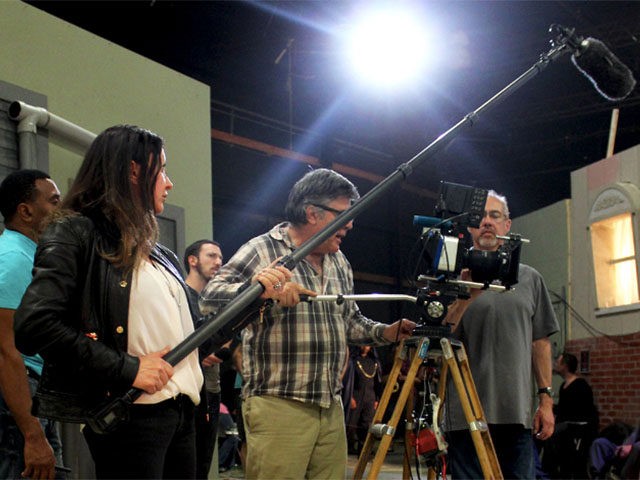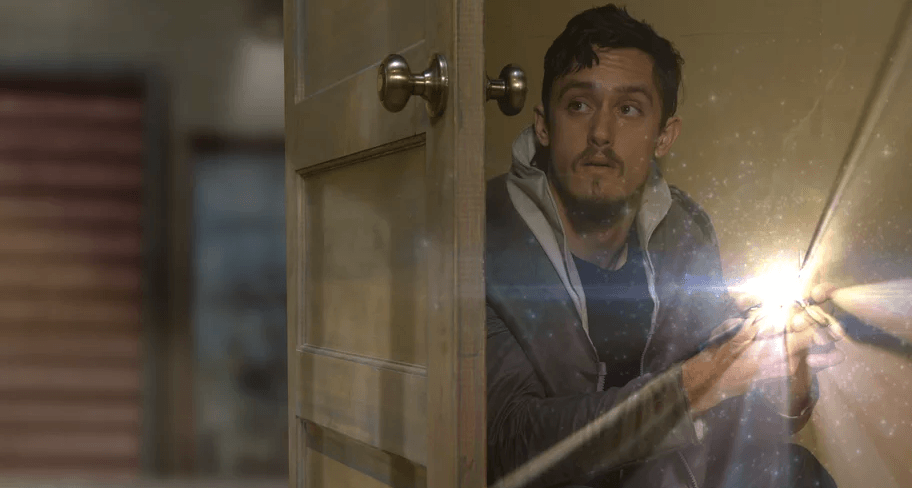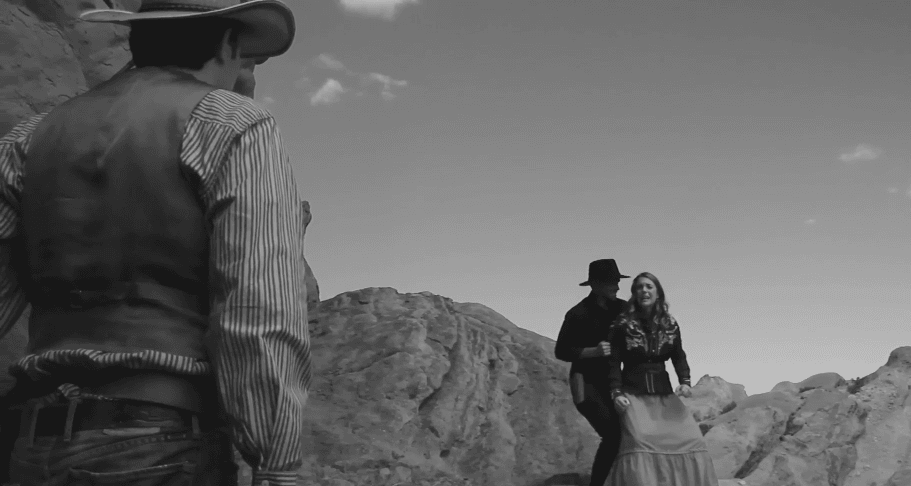Castaic seems an odd sort of town for a movie studio.
And yet, here it is, situated neatly on Fantastic Lane amongst the fast food truck stops in this unincorporated area of Los Angeles County, roughly 50 minutes northwest of the glitz and glamor of the major studios — a sprawling, four-acre compound with six midsize soundstages, a luxury 50-seat screening room and a fully-equipped post-production suite.
In the Picture Editorial Lab, a group of about five editors is busy putting together the studio’s latest effort, a bank-heist picture titled Blindsided; in the adjacent editing suite, another team is working on the visual effects for a 90-minute sci-fi actioner called Timepiece.
“Check this out,” one editor says as he shows off a particularly pretty shot he’s been working on for the latter film, which involves getting the luminous reflection off of a car windshield exactly right. “Pretty cool, huh?”
Inside Stage 4, which doubles as a construction mill, the art department’s Eric Estenzo is hard at work putting the finishing touches on a small, futuristic-looking structure that will serve as an exit portal of an alien spacecraft once it’s on film. The production needs the set to do last-minute pickup shots on Timepiece.
“It’s sort of ambiguous when you’re reading a script, or a description; you have to have that artistic acumen in developing the world,” Estenzo tells me. “This is why I like doing this stuff. It serves my imagination well when I can just come up with some ideas, put them on paper, translate them to three dimensions… and we get something amazing that the actors can work in and the production crew can interact with. That’s exciting for me.”
The lot looks much like any other movie studio, albeit without the bells and whistles of the majors.
But the Lifton Institute of Media Arts and Sciences, or LIMS, isn’t really a studio like those studios. It’s a film school. And the overwhelming majority of its students are United States military veterans.
For 12 weeks, veterans come to LIMS to learn the nuts and bolts of behind-the-camera filmmaking. There are no classrooms; the students — around 100 for the current semester — are put to work almost immediately on the production of a full-length feature film.
There are programs for screenwriting; set design and construction; stunt work; cinematography; video and audio editing; film scoring; production management; wardrobe and costuming; hair and makeup; visual effects. The students are broken up into their selective departments and are thrown directly into the day-to-day of filmmaking, with instructors offering lessons and guidance on the go.
The goal is simple, says Jimmy Lifton, the 61-year-old Emmy-winning film and TV sound engineer who founded LIMS two years ago: get veterans jobs in the entertainment industry.
“I love my fucking guys, man,” Lifton tells me. “Not one of our veteran guys and girls wants a handout. They appreciate that some people want to help them, but what they really want to do is get out there and work and follow their dreams and passions.”
Lifton isn’t a veteran himself. Born in Detroit, he went on to snag an apprenticeship as an organist for the Detroit Symphony before attending the Berklee School of Music in Boston. After a decade of work in the music business, Lifton co-founded the post-production outfit Oracle Post in 1996, which has done work for most of the Hollywood majors; he’s also won two daytime Emmys for his sound editing, for the animated series The Penguins of Madagascar and Kung Fu Panda: Legends of Awesomeness. He’s also been nominated twice for SpongeBob SquarePants.
In 2009, he founded the Lifton Institute of Media Skills in Detroit to capitalize on Michigan’s ambitious film incentive program, but the school was forced to relocate when the state rolled the program back.
“When I went to the Detroit area, we ended up training some fantastic people; out of work auto employees, including some veterans,” he explains. “All the people we worked with were great, but the veterans were outstanding.”
Lifton went almost entirely out of his own pocket on the construction of the LIMS studio in Castaic. About 18 months after its opening, the school has trained more than 200 veterans, with roughly 80 percent going on to get jobs in Hollywood (LIMS was recently awarded for 100 percent job placement in its most recent graduating class).
The school receives some of the funding for its veterans programs from L.A. City and County WorkSource grants and other local programs, and also rents its studio and its employees out to established production outfits. Netflix recently used several soundstages to shoot the second season of its show Flaked, starring Will Arnett.
For some, including the art department’s Estenzo, who served in the Marine Corps., the training method at LIMS isn’t dissimilar from the training methods they’ve used in the military, albeit with a different set of risks involved.
“The military is fond of adaptive learning, this idea of being thrown into a situation where you don’t have all of the answers,” Estenzo says in a pause while working on his alien spacecraft. “When you’re out there on the spot, you’re doing and you’re learning and you’re correcting as you go. And I think that’s similar to what LIMS teaches here, and I think that’s really a strong point.”
None of the veterans I interview speak badly about the Department of Veterans Affairs, despite the horror stories of long wait times and mismanagement that have made headlines around the country in the past few years.
“As far as the VA goes, let’s face it, it’s gonna be hit or miss,” says John A. Rizzi, an Air Force veteran from nearby Valencia who studied production management at LIMS. “Yes, the wait times are long, but… it’s the government.”
Rizzi notes that LIMS has just been added to the VA’s list of approved programs.
“When I went in the VA, they didn’t really know about this place,” he tells me. “Hopefully it’ll open the door for more veterans looking for an education.”
Former students have filled the LIMS website with positive testimonials, with many having said they received industry jobs just a few weeks after getting into the job market.
For some, the school represents much more than a training program. In a recent Facebook post, Army veteran Sgt. Scott Vasquez, a graduate of the school’s stunt program, wrote that LIMS had changed his life after he’d struggled with depression and unemployment.
“I thought it was a scam,” he recalled of an early tour of the facility. “Now, after 512 hours of training, I have found new lifetime friends, camaraderie and a support team that goes deeper than I ever could have imagined. They provided transportation to get [to the studio] and back. When you’re broke it helps. I’ve seen this place put vets to work off the street with my own eyes.”
For Lifton, it’s all about the training. The movies look good, but that’s almost beside the point. He admits he doesn’t yet have plans for what to do with the completed films; maybe they’ll be entered into film festivals.
Meanwhile, he’s focused on expanding his fledgeling school. Lifton wants to build a dormitory on the lot to house some students, particularly the homeless veterans who attend the program. He also wants to increase the class size to 300 students per semester. This year’s VET 200 will expand the program to include post-9/11 veterans.
Lifton’s also excited to start pre-production for the upcoming semester’s project, an anthology film tentatively titled Casket Lake.
“They don’t stop until the job gets done,” Lifton says of his guys. “If something breaks, they don’t sit there and worry about it. They fix it or work around it. And that’s a perfect movie crew member. That’s what they do.”
Follow Daniel Nussbaum on Twitter: @dznussbaum



COMMENTS
Please let us know if you're having issues with commenting.